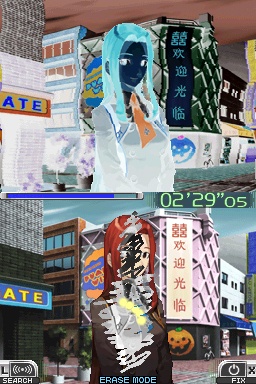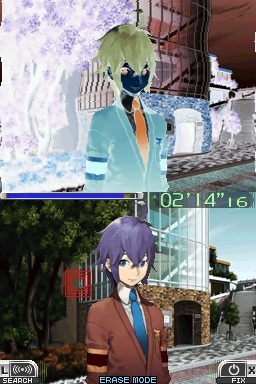Video games have come a long way since simply urging you to save the princess, and these days they increasingly present stories with complex, mature themes and social commentary. Lux-Pain, from publisher Ignition Entertainment, is a novel-style adventure game in the vein of the Phoenix Wright series, and it attempts to deliver a poignant experience to Nintendo DS owners. Instead, it is quickly tripped up by a plethora of embarrassing localization miscues, and what little exciting gameplay there is cannot break its fall.
The general concept is easy enough to grasp. An infection known as "Silent" has been spreading around the city of Kisaragi, causing citizens to organize group suicides, commit delinquent and criminal acts, and basically just go nuts in one way or another. As Atsuki Saijo, a member of an anti-Silent group called "FORT," you're charged with going undercover as a high-school student to ultimately uncover patient zero: the original Silent victim. Bestowed with telepathic powers, you'll spend the next few weeks reading the thoughts of your classmates, teachers, and neighbors to deduce who Silent has infected and, hopefully, remove the infection.

Powerful emotions within people as well as residual emotions lingering in the environment--both referred to as "shinen" and represented as parasitic worms in the game--are the keys to uncovering the thoughts throughout the game. Atsuki automatically senses these, and when he does, a probing minigame is activated. In it, you simply tap at the touch screen to determine where a hidden shinen lies, scratch away at that area to reveal the shinen, and then hold your stylus on the worm to remove it.
The results of a successful probe are nothing short of baffling: The worm manifests itself into a "term," which is just a short phrase consisting of no more than a few words (such as "dumb kids," "kill them," or "nice guy"), which you must then "imprint" back into the characters' minds to discover what they're thinking. These thoughts range wildly from homicidal, self-loathing, and even flirtatious. Armed with the knowledge that you're supposed to gain from reading these thoughts, as well as information that you pick up through normal dialogue in school and on the street, you can track down Silent victims, have FORT examine the extracted infections, and find the original infection.
Sadly, this interesting idea never really pans out. A large portion of the dialogue is poorly and inconsistently localized, giving off the impression that multiple translators used different criteria in determining how to express given lines in English. It also seems as if the source material was scattershot. What you're left with are lines of dialogue that seem slightly out of sequence in relation to each other. You're also exposed to long chats that simply drag out the time between important plot points, such as the 30-plus lines about hunger and homemade cookies before finding out that a friend just landed herself in the hospital. This all makes the story harder to follow than it should be, and detracts from your ability to think about where to go and who to contact to achieve your goal.
Even worse, at the most basic level, you're showered with grammatically incorrect and confusing sentences such as, "Seeing such joy is what is to some people," or those that were simply translated too literally such as, "I ate his mind." Colloquialisms such as "wanna" and "gotta" are followed inexplicably by single apostrophes. Finally, it's almost guaranteed that you'll encounter an egregious spelling mistake nearly every hour. Taking the most basic plot points into account, it's pretty clear that Lux-Pain's story was inspired by serious social issues (parental negligence, serious depression, and suicide). It's a shame that the botched localization results in too much unintentional humor to take any of Lux-Pain's commentary seriously.
Despite the localization's best efforts to thwart your progress, proceeding through the game is never really a problem because Lux-Pain is a very guided experience--so much so that it ends up a bore. You simply tap on active points on the map to visit an area and talk to anyone standing there, but half of the time, the game dictates specifically where you can go. In addition, you rarely get to choose what to ask of whoever you encounter. More often than not, the person will show up, spit out reams of irrelevant dialogue, and leave. Thus there's little need to try to sift through the (largely useless) information that you've accumulated, given that progress is reduced mostly to visiting every possible place until you find a Silent victim.
When you do encounter someone who is infected by Silent, Atsuki detects this (without any effort from you, naturally) and the game launches into Silent-Removal mode. This is the most mechanically involving portion of Lux-Pain's gameplay; one of several minigames make you poke, slash, and chisel away at white blobs on the touch screen to successfully remove the Silent. These sections are only occasionally challenging and don't make up at all for the game's other deficiencies. To add insult to injury, one Silent encounter resulted in a Game Over screen without any explanation--even after the Silent was defeated.
With neither thrilling gameplay nor an immersive story, the presentation in Lux-Pain simply goes to waste. The anime-inspired character art is colorful, if not all that well animated. The English voice actors recognize how awkward the translation is and paraphrase much of their dialogue such that you're actually able to understand and appreciate small pockets of the story. Your in-game cell phone can receive optional news broadcasts, e-mail, and ringtones, and the local Internet cafe has a message board that's updated with information every day (though you can't post on it yourself). There are even multiple endings based on whose Silent infections you've removed. Sadly, the game fails to deliver on the most basic element of a novel-style adventure so any added features are wasted, much like any time you'd spend with Lux-Pain.




